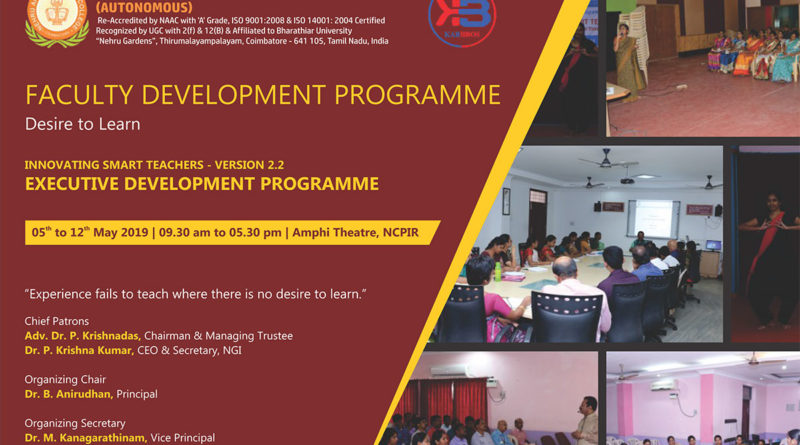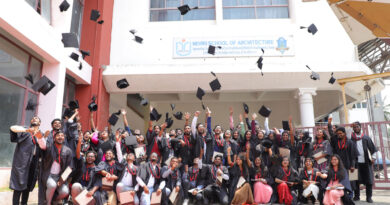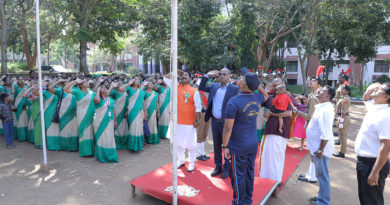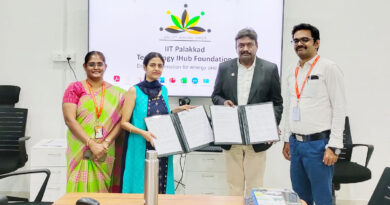National Executive Development Programme
DAY 01: 06/05/2019
The Inaugural Ceremony began at10.00 AM with a prayer and Dr. N. Shani, Dean, Academic Affairs welcomed the executives and the dignitaries. The Chief Guest was honoured by welcoming her with a bouquet. After the ceremonial Lamp Lighting Ceremony, Dr. B. Anirudhan, Principal, Nehru Arts and Science delivered the Presidential Address. The Chief Guest, Ms. Shyama Iyer who is the National Coordinator of Spoken Tutorial, IIT, Mumbai delivered the keynote. Dr. M. Kanagarathinam, Vice Principal, NASC expressed the vote of thanks.
After the tea break and photo session the executives attended the main session based on ICT and Spoken Tutorial taken by Ms. Shyama Iyer, National Coordinator of Spoken Tutorial, IIT, Mumbai. It was a mind blowing session enabling us to attain Spoken Tutorial as our knowledge partner. It’s an award winning IT Training program enhancing the skill set of students and thereby exalting the college image and value of the education.
Dr. B. Anirudhan, Principal, Nehru Arts and Science presented a memento to the Chief Guest Ms.Shyama Iyer, National Coordinator of Spoken Tutorial, IIT, Mumbai.
Afternoon session was hands on and all the executives were exposed to the Spoken Tutorial Courses. Everyone was excited to register for a test which falls on 30th of May. Ms. Vijaya. A, Assistant Professor, Department of Computer Science took up the session in a brilliant way.
The vibrant personality of the morning session and afternoon session were Ms. Rani D’Souza and Mr. Yashesh Jayantilal Ranpura.
Day 02: 07.05.2019
Dr. N. Kavitha, HoD,Computer Science was the rapporteur of both the sessions. She introduced the resource person Dr. B. Anirudhan, Principal, Nehru Arts and Science College. He was honoured by welcoming him with a bouquet by Dr. M. Kanagarathinam, Vice Principal, Nehru Arts and Science College.
After a brainstorming session about the concept of mentoring, he gradually explained several types of mentoring, its significance and its impact on student folk. Referring to many case studies and his experiences, he slowly portrayed all the aspects and dimensions of mentoring. He spoke about building, training and nurturing mentees and the process involves recruiting, interviewing, inspiring, counseling, motivating, evaluating, monitoring.
He urged them to be in teams to involve themselves as mentor and mentee so that they could experience the practical aspects of hands holding and moulding.
After the evaluating session of mentors and mentees of five different teams, two mentors were recognized as the great mentors namely Dr. R .Swarnalatha, PSG College and Dr. M. R. Kumaraswamy, Gobi Arts and Science College.
The second session probes into Outcome based Education and its possibilities. The complexity and obscurity is brought into fore by the statistics given. The strategy of result oriented learning and teaching needs to be implemented in all the institutions. Citing the example of driving and swimming he took the executives to the big picture of Outcome based Education. What is learnt is more important than what is taught. Learning through analysis, research, visualization and application is the need of the hour. What is vision; mission, philosophy, CO’s, PO’s,and Knowledge 1-7 are thoroughly summarized. They had an interactive session immediately after the class.
The vibrant personalities of the afternoon session were Dr. B. S. Ravikumar, Hassan and Mr. Samrat Srivastava, Mumbai.
Day 3: 08.05.2019
Dr. M. Kanagarathinam,Vice Principal, NASC was the rapporteur of the morning session.
Dr. Prof. S.Sivasubramaniyan, Former Vice Chancellor of Bharathiar University was the resource person. He was honored by welcoming him with a bouquet by Dr. Anirudhan, Principal, Nehru Arts and Science College.
His talk was on Ecosystem in Higher Educational Institutions. He made the executives to probe on innovation Ecosystem by specifically describing about NAAC criteria such as innovative curriculum design, innovative teaching and learning, innovative evaluation, innovative research, innovative infrastructure, innovative student support, innovative institutional values, innovative best practices etc.
He explained smartness as anticipating and acting appropriately. The reverse analysis is based on critical thinking which is examination centric, teacher centric, text centric, tradition centric, corruption centric, compromise centric. These need to be transformed as understanding centric, student centric, subject centric, ICT centric, merit centric, impartiality centric.
He urged the executives by empowering students to study on their own by MOOC and multiple intelligence enhancing HOTS Higher Order and Thinking Skills. He told about challenging curriculum which makes differences among students’ competencies.
Dr. N. Devaki, Educational Technologist, Gandhigram Rural University, Dindugal was the resource person. She was honored by welcoming her with a bouquet by Dr. B. Anirudhan, Principal, Nehru Arts and Science College. Her session was on Collaborative Learning and Innovative Pedagogy. Her session was so splendid and interactive that she was able to elicit answers for a set of questions she prepared. She showed the platforms to make education a happier experience.
She explained various dimensions of pedagogy by videos, chain story game, tracing qualities of others and other activities. She carried over the interest throughout the session by her pleasing handling of the topic. Ms. Shylendra Dhanaya, AJK College was chosen as the vibrant personality.
Day 4: 09.05.2019
Dr. M. Kanagarathinam,Vice Principal, NASC was the rapporteur of the morning session. Dr. S. Senthilnathan, Director of UGC – HRDC, Bharathidasan University, Trichy lead the session on Enriching Learning with digital experiences. He talked about open educational resources and ICT competencies. He made a distinction between teachers with technology and teachers without technology. He familiarized us with the etymology of digit, progression of digital to digital global citizenship.
He enabled us to analyze new processes and practices that brought evolution in communication and interactions in comparison with teaching and learning process. He posed a universal question that how we are satisfied with blackboard. He discussed new media impact and digital age pedagogy in the art of teaching and method of learning and about digital natives , digital immigrants, revisiting Prensky, DK – digital kids, Neo – generation Alphabet, 3 Apples, X,Y,Z generations in a splendid manner. Why do I need teacher, Can Google replace a Guru? Multi taskers, Infographics, Online Collaborators, Visual experience of learning are other interesting topics. There should be a shift from technology as a teacher to technology as a partner. Teachers should be orchestrators of learning and not a dispenser of information through HOTS Higher Order Thinking Skills. He urged us to be networked teachers that are able to learn, unlearn and relearn.
Afternoon session was hands on and all executives were eagerly involved in hunting down the websites that can be explored for enhancing the digital competencies. They created a separate blog for themselves. Resource person directed and facilitated the session. Ms. Anitha M.C., Assistant Professor, Department of Food Science and Nutrition, Nehru Arts and Science College was selected as vibrant participant for the session. Mr. Tony, Head, Department of Physics, Nehru Arts and Science College received a prize for the musical chair event conducted on 07/05/2019 in the camp fire event.
Day 05: 10.05.2019
Dr. R. A. Ayyapparajan was the rapporteur. Mr. Sadiq Agha, Sales Manager,Young India films, Chennai and Mr. Venkatachalam, Business Development Manager, Chennai were the resource persons. They explained the nuances of each stroke that can play on a smartboard.
A SMART Board is an interactive whiteboard that allows you to project an image and ‘interact’ with it by writing on it or moving it around. The SMART Board is connected to a computer and works with a projector. The projector displays what is open on the computer and, rather than using a mouse or keyboard. The SMART Board is a touch screen, which allows you to manipulate anything on the screen using your fingers. It is similar to how you would use a tablet or iPad. Special pens are included in a SMART Board to make writing in different colors quick and easy.
They discussed ‘Why are they so easy to use?’ and explored the numerable facilities that they provide.
Day 05: 10.05.2019 AN
Afternoon session all the executives were taken to NOBLE Nehru Outbound Centre for an outbound training. Numerous feats and games were performed.
All the participants performed 3 low rope activities namely burma bridge, earthquake and shekira bridge and 5 ground activities namely 7up name, jump-in and jump-out, dragon shoe, tyre change and bridge building. Through this activity the participants learnt the confidence, team spirit, encouragement and finding out the solutions for the problems
Day 06: 11.05.2019
Dr. N. Kavitha, Associate Professor &Head, Department of Computer Science was the rapporteur of both the sessions. Dr Thiyagu, Associate Professor, Department of Education, Central University, Kerala was the resource person. Dr. Anirudhan, Principal, Nehru Arts and Science College, lead the session on Micro teaching.
Dr Thiyagu lead the session on Micro teaching. He told about TPC Knowledge that is Content Knowledge, Pedagogical Knowledge, and Technological Knowledge. He explained what microteaching is and microteaching phases. He gave the ideas of feedback mechanism. He taught and made us learn about Core Teaching Skills. He gave demonstrations so as to elicit answers and provoke innovative ideas. He showed self- explanatory and interesting videos. He explained each skill specifically by the related components and description of behavior. Skill of explanation, skills of reinforcement, skills of stimulus variation, skill of probing questions are taken in-depth and with demonstrations. Several videos were shown to convey certain concept and ideas.
Afternoon session was an open platform for the executives to plan, execute and conduct the microteaching class for five minutes. Peer teachers were to give the feedback and the videos taken for revaluation for themselves. Ms. K. G. Licy, Academic Coordinator and PRO, KR’s Sree Narayana College, Thozhuvanoor was chosen as the vibrant personality. The executives were much content to have such an exceptional session to look at themselves at different angles.
Day 07: 12.05.2019
Mr. P. K. Manoj Kumar, Associate Professor & Head, Department of IT and CT was the Rapporteur. Ms. Annapurna Madhuri, Center Coordinator, SMIORE Academy for Teacher Training, Sandur was the resource person. Dr. B. Anirudhan, Principal welcome the resource person with bouquet.
Resource person started the session with the traditional method of teaching practices. Then the session continued with 21st century learning practices. How to handle the 21st century students using flipped classrooms. The session covered what is meant by flipped classroom. Essentials of flipped classroom. Why to flip the class. The process of creativity of flipping the classrooms. How to connect bloom’s taxonomy in flipped learner’s portal. Then the session continued with the hands on training using edmodo platform




















